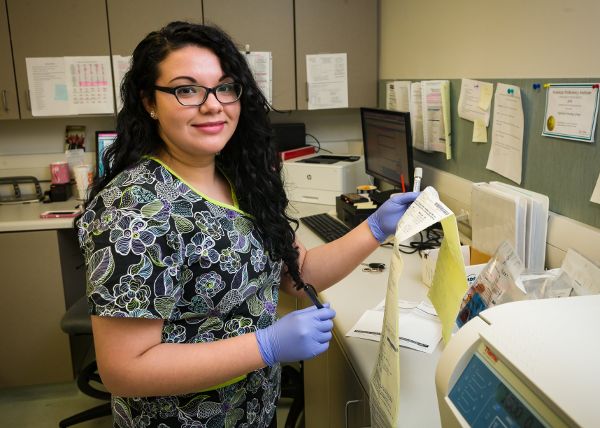Overview
Bladder cancer begins when cells in the urinary bladder start to grow uncontrollably. A tumor can form when more cancer cells develop, and it can spread to other areas of the body.
The bladder is an organ which stores urine before it leaves the body and has flexible, muscular walls. The muscular walls of the bladder are made up of many different layers and types of cells. Most bladder cancers starts in the innermost layer. As it grows and spreads, the cancer becomes more advanced.
Types of bladder cancer include:
- Urothelial carcinoma, also known as transitional cell carcinoma (TCC)
- This is by far the most common type of bladder cancer.
- Squamous cell carcinoma
- Adenocarcinoma
- Small cell carcinoma
- Sarcoma
Symptoms
Often the early stages of bladder cancer cause bleeding, but little or no pain or other symptoms. Blood in the urine is the most common symptom for bladder cancer. This symptom may be present, then absent for a period of time. It is important to note blood in the urine can be caused by a number of other non-cancerous causes, but it is important to be checked by a medical professional with this symptom.
Other symptoms may include:
- Changes in frequency of urination
- Pain or burning during urination
- Difficulty urinating or weak urine stream
- Lower back pain on one side
- Loss of appetite and weight loss
- Feel lethargic or tired
- Feet swelling
- Bone pain
Risk Factors
People who smoke are three times as likely to get bladder cancer as nonsmokers. Smoking is the cause of about half of all bladder cancers in men and women. Some chemicals have been linked with this cancer, called aromatic amines. Other workplace exposures to chemicals and dyes include makers of rubber, leather, textiles, paint products and printing companies.
There is a possible link between prolonged use of the diabetes medication pioglitazone (Actos) and bladder cancers. Also, dietary supplements containing aristolochic acid have been known to cause an increased risk for bladder cancers. People who drink a lot of fluids, especially water, tend to have lower rates of bladder cancer.
People of white ethnicity are twice as likely to get bladder cancer, compared to African Americans and Hispanics. Risk for this cancer also increases with age – 90% of those diagnosed with this cancer are over the age of 55. Bladder cancer is more common in men than in women.
Other risk factors include: chronic bladder infections, personal history with bladder cancer, bladder birth defects, family genetics, pelvic exposure to radiation and prior chemotherapy Cytoxan.
Prevention
While some risk factors, such as age, gender, and race cannot be controlled, there may be some things you can do to lower your risk of bladder cancer:
- Stop smoking. Smoking is thought to cause about half of all bladder cancers.
- Limit exposure to chemicals in the workplace
- Drink plenty of fluids, especially water
- Eat lots of fruits and vegetables
Diagnosis
A detailed medical history and physical exam will be performed. Your doctor will ask questions about your risk factors and family history. The physical exam may include both rectal and pelvic exams. Some lab tests may be ordered, including: urinalysis, urine cytology, urine culture, and urine tumor marker tests.
Cytoscopy may be used for the doctor to look at the lining of the bladder. If an abnormal area is seen, the area may be biopsied. This biopsy is needed to confirm the diagnosis. Two important features of the biopsy results include: invasiveness and grade (low or high).
Other imaging tests may be used in addition to the diagnostic tools discussed above. These may include x-rays, MRI, CT, Ultrasound, and Bone Scans.
Treatment
The treatment plan will depend on the stage of the cancer, as well as other factors. Our doctors will work closely with you and your family determine the best treatment plan for you. Options for treatment could include:
- Surgery
- Intravesical therapy
- Chemotherapy
- Radiation therapy
- Immunotherapy
Your doctor may decide more than one of these treatment options will be in your best interest. Surgery is the most common treatment option and can often remove early-stage bladder tumors. Close follow up will be required for bladder cancer patients.







